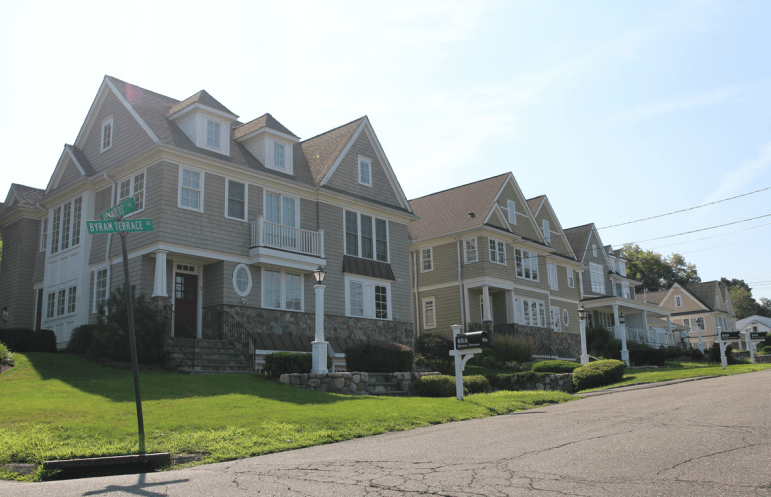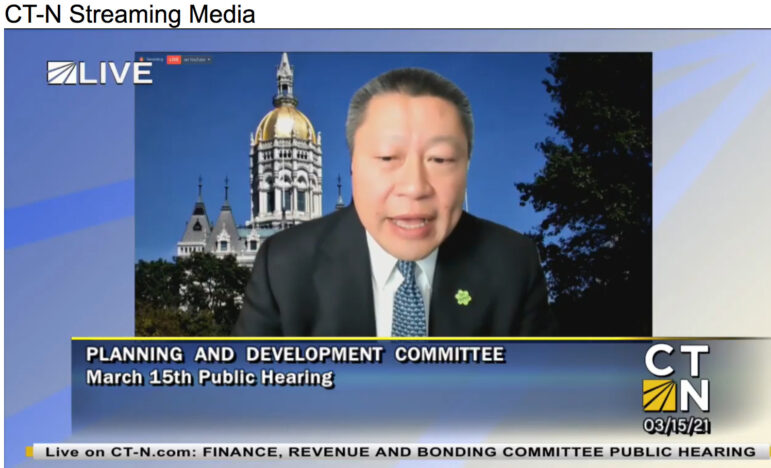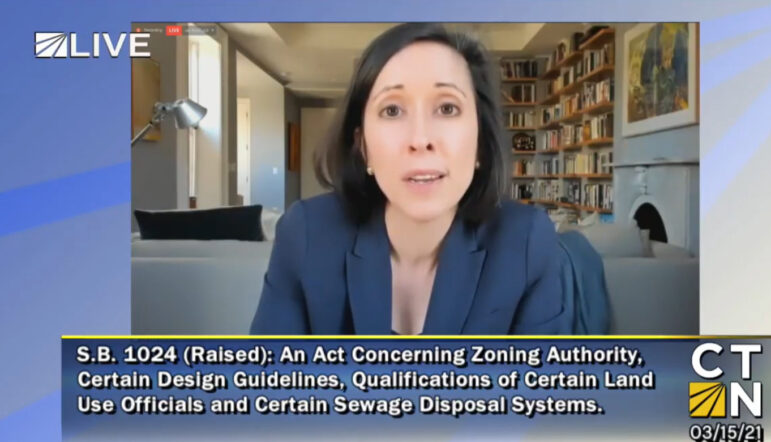A marathon Planning and Development committee meeting that started Monday morning and remained in progress as of the time this story was published, covered several bills, but most of the testimony was about SB 1024. (This report is based on testimony from 10:00am until about 9:00pm).

No one disagreed that zoning was used historically in Connecticut to deny access to people of color. Proponents of the legislation said it would work toward removing vestiges of that discriminatory zoning.
There was a moment that Greenwich was lumped in with Woodbridge, the target of a lawsuit for having almost exclusively single family zoning.
Greenwich has a variety of zones that range from multi-family housing in Chickahominy and Byram, both densely populated neighborhoods, to single family homes in the 4-acre zone in back country.
Greenwich First Selectman Fred Camillo, who spoke against 1024, said that Greenwich had more diversity than people from other parts of the state might be aware, and that the town had been chipping away at achieving the 10% requirement from 8-30g, the state affordable housing statute.
He noted that if 1024 were to pass, and bring a proliferation of multi-family developments “as of right,” that the 10% goal would move further away from reach.
“These proposed bills not only ignore the economic reality of home pricing in high opportunity towns, but their adoption will suffocate efforts in affluent communities to create actual affordable units via private sector development.”
– Danielle Dobin, P&Z chair for Westport
“Having an opposite opinion doesn’t mean you’re bigoted. It doesn’t mean you’re closed minded,” Camillo continued. “I keep hearing ‘Greenwich’ thrown around a lot. We are doing a very good job and we’re very proud of that. We think these decisions are best left to local authorities that know their towns.”
“This notion that we’re against (affordable housing) and there are code words, and you can’t say the word ‘character,’ …when people start playing with words like that and start ascribing views, I’m sensitive to that,” Camillo said.
“The Town of Greenwich has seen an increase in the non white population of over 25% since 2000,” Camillo added.
At the outset of the hearing there were over 340 people signed up to speak, and people waited hours and hours for their allotted 5 minutes.
In addition to Camillo, speakers included Luke Bronin who is Mayor of Hartford and president of Connecticut Conference of Municipalities “CCM”; Sara Bronin, an architect, professor and founder of DeSegregate CT; and P&Z commission chair for Westport Danielle Dobin.

Ranking committee member Senator Tony Hwang (R-28) which includes Fairfield, said he was disappointed that despite so many members of the public wanting to testify, they would be limited, and in fact many waited all day and into the night to do so.
“Unfortunately I have had no participation in drafting the bills though many special advocacy groups have worked closely on drafting the bills,” Hwang said, later adding, “The process didn’t work.”
Sara Bronin said she had indeed emailed Senator Hwang on multiple occasions to engage him.
Senator Hwang questioned the 1024 endorsement of the CCM working committee, at one point calling it the “DeSegregate CT working committee,” adding he didn’t think there had been enough outside experts helping to craft the bill.
Republican State Rep Doug Dubitsky, who represents 9 rural towns in the northeast part of CT, asked Mr. Bronin whether it was a conflict that he led CCM and his wife led DeSegregate CT.
“I’m always wearing my husband hat, but today I’m not wearing that hat. I’m someone who has believed our state has suffered from lack of housing diversity,” replied Mr. Bronin, a Democrat.
Later, CCM Executive Director Joe DeLong said that most of the crafting of the legislation had been done before Mr. Bronin became the president of CCM last July.
Republican State Rep Kimberly Fiorello, representing the 149th district including Greenwich, asked Mr. DeLong why CCM’s working group started out with the DeSegregate CT platform, rather than start from scratch.
DeLong said it was because DeSegregate CT had reached out and offered.
He said the CCM executive committee then created a working group to work with DeSegregate CT.
“They viewed DeSegregate CT as a whole coalition,” he added. Indeed DeSegregate CT has dozens of member groups.
But there were also questions about the CCM vote.
Mr. Bronin said there had been no votes against the legislation and just two abstentions.
Meanwhile, Greenwich P&Z chair Margarita Alban called into WTIC 1080 AM Monday morning to clarify a remark earlier in the show by Sara Bronin that might have given the impression Alban endorsed the legislation.
“I have not endorsed the bill,” Alban said. “One of the reasons my town does not endorse it is it doesn’t create greater equity in the state. It does not actually engender affordable housing.”

Alban also said the proposed legislation would take away local control, and remove the opportunity for residents to speak out at public meetings.
Many committee members with reservations about the legislation repeated concerns about loss of local control, a “state takeover” of zoning, and a “one-size-fits-all” approach.
Senator Hwang said the bill did nothing to help urban or rural settings.

Both Mr. and Mrs. Bronin addressed the pushback to the legislation.
“People believe it does more than it does,” Mr. Bronin said.
“Can you understand the hysteria around this,” Senator Anwar asked Mrs. Bronin.
She replied that people were expressing fear about what zoning reform might bring.
“It’s not onerous,” she said, adding that people who are cost burdened by housing are limited in where they can live and deserved access.
Cost burdened means a family spends more than 30% of their income on housing. Severely cost burdened means spending more than 50% of income on housing.
State Senator Dan Champagne, a Republican who represents the 35th district which includes 13 towns in the northeast of the state, asked Mrs. Bronin, “So we want to lower the house cost there so people can move in there?”
“Yes, in those targeted areas,” Mrs. Bronin said.
“If I put a 4-unit dwelling in a town that’s expensive to live in, what do you think the rents will be?” Champagne asked.
Mrs. Bronin said 1024 would not prevent a town from requiring an inclusionary unit in a 4-unit development.
“There are towns where a 4-unit will be naturally affordable because of land prices, where a 4-unit dwelling would be great and affordable,” she added.
Senator Champagne pressed on, asking whether the 4-unit development replacing a single family home would be less expensive.
Certainly in Greenwich recent developments near the main Greenwich train station feature units that cost millions of dollars.
“Towns provide less infrastructure for a 4-family house than a one family house,” Mrs. Bronin replied. “You’re spending more money per unit on single family housing.
While her premise was that increasing supply of housing would decrease housing prices, she argued that having more units would keep property taxes down.
The elephant in the room was the impact the legislation would have on property values, especially in towns where land is expensive and property values are high like Greenwich and Westport.
Camillo said that for most Greenwich property owners, their home was their biggest investment, and many were ‘house poor.’
Mrs. Bronin said DeSegregate CT had collaborated relentlessly, had done extensive research and had looked at 30,000 pages of zoning regulations.
“I wish people would say it is a tremendous opportunity,” Mrs. Bronin added, at one point responding to Senator Anwar saying, “People who grow up in diversity have better outcomes. Zoning is at the root of much of the ills we seek to address.”
“Nothing in 1024 is not supported without tons of research,” she continued.
State Rep Fiorello referred to the legislation as having “mandates,” while Mrs. Bronin referred to “guidelines.”
“It’s not correct to say this is a takeover of local zoning,” Mrs. Bronin said.
“The bill uses language like null and void,” Fiorello said, adding that the bill requires local officials to undergo training.
“It’ll help save them money over time from lawsuits,” Mrs. Bronin said.

Later in the hearing State Rep Roland Lemar, a Democrat whose district includes New Haven, brought up lawsuits against Greenwich after Fred Camillo spoke in opposition to the bill.
“We haven’t invested in education for our officials,” Lemar said. “Your town has been sued for more zoning violation processes than any other town in the state. I assume that is causing a huge financial burden for your community.”
Mr. Camillo was cut off from responding due to time limits, but it is noteworthy that Greenwich has not lost a lawsuit or rezoning that went to court in 16 years.
As for parking, Camillo said it had been a concern in Greenwich for decades. Under 1024, there are no minimum parking requirements or the transit oriented district that Greenwich would be required to create.
“The thought of not having control over what is essentially a local problem is what’s making people uneasy,” he said.
“We’re talking about scores of millions of dollars of public investment…I think it’s reasonable for us to ensure that there is access to those investments,” Lemar said. “Right now if I wanted to get into a train station in Greenwich I would have to buy a multi-million dollar home and then spend thousands of dollars a year for a local parking pass.”
Supporters of the legislation noted that market preferences for housing had changed, and demand is for walkability, and living close to amenities and transportation.
Mrs. Bronin said she worked with a number of graduate students at Yale who don’t wind up staying in CT after graduation.
“They mostly take jobs in Boston and New York because they think Connecticut is too expensive,” she said, adding that most millennials don’t have cars and don’t want to live on two acres.
Toward that end, the legislation in 1024 would require that towns (except those exempt) to each create a Transit Oriented district with four-family housing in a 1/2 mile radius of half of the transit feature, be it a train station, ferry terminal or bus depot.
Greenwich, for example, with 4 train stations, would designate one station for the district, likely the main Greenwich train station on Railroad Ave.
There was talk about whether increased density resulting from the legislation, if passed, would impact public school enrollment, whether emergency services were adequate, and adequacy of septic lines.
Senator Derek Slap, whose district includes West Hartford, defended the legislation, saying it would eliminate barriers for people wanting to live in an accessory dwelling units “ADUs” or multi family houses. He said the legislation would create more diverse communities.
There was a lot of interest in the topic of ADU’s.
While towns with populations less than 7,500 people will be exempt from much of the legislation, but would still be required to allow ADUs, each with one parking spot and “Main Street Zoning.”
State Rep Joe Zullo, (R-99) serving East Haven said some towns don’t have ADUs because they don’t know whether the increase in parking can be accommodated.
He asked Mrs. Bronin whether the legislation did anything to prevent ADUs from being used for short term rentals.
“My concern is people will seize the opportunity to make an income stream,” he said.
“It’s explicit to ensure that towns can restrict that use. By definition ADUs increase rental opportunities. There is no reason to fear they’ll be used for short term rentals. There are municipalities that regulate Airbnb’s or short term rentals, and they have every right to under this bill.”
The topic of property values came up, which is certainly relevant for towns with high property values including Greenwich and Westport.
The P&Z commission chair from Westport, Danielle Dobin, said in the last several years, her commission had approved a dozen mixed income, multifamily projects, each with a minimum 20% deed restricted affordability, including projects adjacent to their train station and Main Street.
She said 1024 ignored the need for affordable housing and focused instead on “as of right” market rate multifamily developments.
She said flooding the market with housing units would still result in expensive units in towns with expensive real estate.
“The problem is that with locations like Greenwich, New Canaan and Westport, where new townhouses and condos are so expensive,” Dobin said. “There is a new project in New Canaan adjacent to their downtown. It’s beautiful and the new units are selling for $2.5 million. Let’s assume the market is flooded and prices are reduced by 30%, those units will not be this missing ‘middle housing.”
She said the idea of one-solution-for-every-town was flawed.
“These proposed bills not only ignore the economic reality of home pricing in high opportunity towns, but their adoption will suffocate efforts in affluent communities to create actual affordable units via private sector development,” Dobin said.
Ms Dobin said Connecticut already had a mechanism to bypass local zoning laws if there is insufficient housing.
“That’s 8-30g,” she said, adding that, for example, in Weston, where there had never been an 8-30g application, “It has a lot to do with land prices, what things can sell for, and sewer access – and nothing to do with what the zoning is.”
The hearing was in progress as of the publication of this story.
See also:
Concerns Mount that CT Municipalities Are “Under Assault” with SB1024, “The Desegregate CT Bill”
March 12, 2021
CT Sweeping Zoning Legislation, SB 1024, Aims to Increase Overall Housing Supply
March 11, 2021
A Window into the Crafting of DeSegregate CT State Zoning Legislation
Jan 25, 2021
Jan 21, 2021